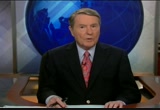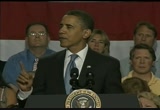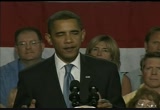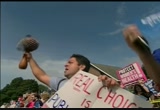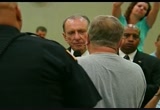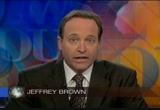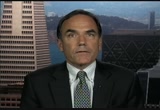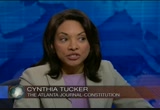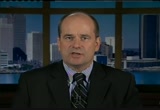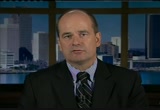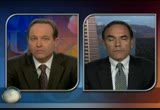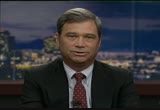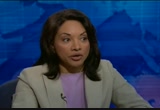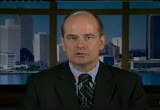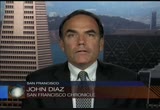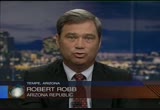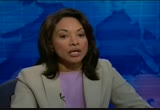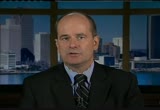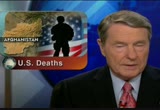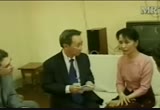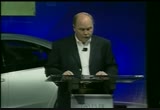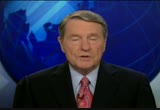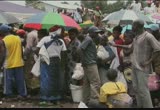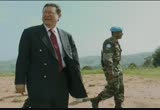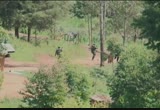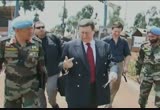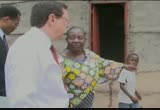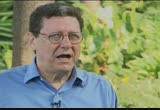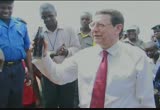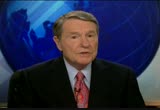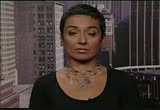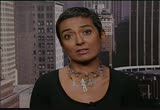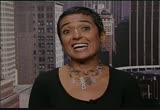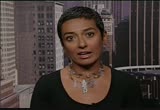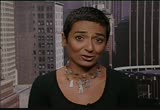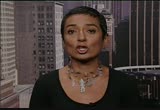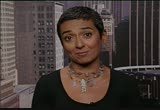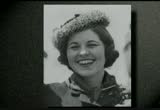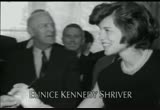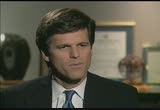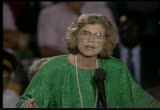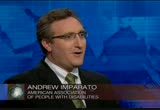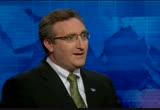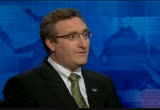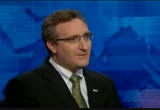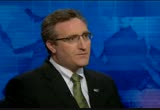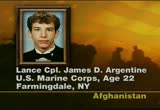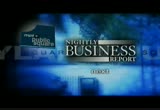tv The News Hour With Jim Lehrer PBS August 11, 2009 6:00pm-7:00pm EDT
6:00 pm
captioning sponsored by macneil/lehrer productions >> lehrer: good evening. i'm jim lehrer. on the newshour this tuesday, the lead story is president obama takes his health care reform case to new hampshire: we have our own debate among editorial page writers; then come the other news of the day, including the latest from burma on the sentencing of nobel peace
6:01 pm
laureate aung san suu kyi; the latest on the tragedy-torn democratic republic of the congo, as secretary of state clinton wraps up a visit; and a review of the special legacy of eunice kennedy shriver, who died today. major funding for the newshour with jim lehrer is provided by: >> what the world needs now is energy. the energy to get the economy humming again. the energy to tackle challenges like climate change. what if that energy came from an energy company? everyday, chevron invests $62 million in people, in ideas-- seeking, teaching, building. fueling growth around the world to move us all ahead. this is the power of human energy. chevron. intel. supporting math and science education for tomorrow's innovators.
6:02 pm
the william and flora hewlett foundation, working to solve social and environmental problems at home and around the world. and with the ongoing support of these institutions and foundations. and... this program was made possible by the corporation for public broadcasting. and by contributions to your pbs station from viewers like you. thank you. >> lehrer: president obama tried to build new support for his health care plan today, and he charged opponents are trying to scare people. the president got a friendly reception at a town hall meeting in portsmouth, new hampshire. jeffrey brown has our lead story report. >> reporter: this was mr. obama's first foray into new hampshire as president, and he made clear he was ready to go on the offensive in what has become
6:03 pm
a rancorous national conversation on health care. >> let's disagree over things that are real, not these wild misrepresentations that bear no resemblance to anything that's actually been proposed. the way politics works, sometimes, is that people who want to keep things the way they are will try to scare the heck out of folks, and they'll create boogiemen out there that just aren't real. now the hard part, because the history is clear. every time we come close to passing health insurance reform, the special interests fight back with everything they've got. they use their influence, they -- they use their political allies to scare and mislead the american people, they start running adds. this is what they always do. we can't let them do it again -- not this time, not now. >> reporter: while pushing his plan to expand coverage to the uninsured, the president today
6:04 pm
repeatedly sought to address the vast majority of americans who already have insurance and worry about what change might bring, and he came down hard on insurance companies. >> now, let me just start by setting the record straight on a few things i have been hearing out here about reform. under the reform we're proposing, if you like your doctor, you can keep your doctor. if you like your health care plan, you can keep your health care plan. you will not be waiting in any lines. this is not about putting the government in charge of your health insurance. i don't believe anyone should be in charge of your health insurance decisions but you and your doctor. >> i don't think government bureaucrats should be meddling, but i also don't think insurance company bureaucrats should be
6:05 pm
meddling. that's the health care system i believe in. >> reporter: the president spoke to, and took questions from, a cordial crowd of 1,800, most of whom applied for tickets online. at one point, he had to ask for questions from those who don't like his plan. >> somebody here who has a concern about health care that has not been raised, or is skeptical and suspicious -- >> reporter: outside the high school where the meeting took place, the debate that's been growing around the country recently was more on display. its supporters chanting. and opponents showing their ire. >> i earn my health insurance. i pay for it with my money that i work very hard for. >> you're paying for it, i hope you're happy because he's enjoying your tax money -- >> reporter: republican state representative sean doherty was on hand, too, armed with his own flow chart. he said it depicts the bureaucracy the president's plan would create. >> i came out here to express my
6:06 pm
opposition to the current health care reform plan that the president is proposing. i support reforming health care, but this is not the reform that i support, and i think it creates a giant bureaucracy and it would actually harm our health care system, not help it. >> reporter: that opposition has become increasingly loud and combative as members of congress meet with constituents in their home districts, as today with democratic senator arlen specter of pennsylvania. >> one day god is going to stand before you and he is going to judge you and the rest of your damn cronies up on the hill. and then, you will get your just deserts. i'm leaving. >> ok, ok. ok. we have just -- we just had a -- we've just had a demonstration of democracy. >> president obama's plan will end unfair -- >> reporter: with the president fighting back, the democratic national committee has just
6:07 pm
launched an ad called "something in it for all of us." >> health insurance reform means your family's care comes first, not insurance-industry profits. call congress. tell them when it comes to health insurance reform there is something in it for all of us. >> reporter: the ad is running on cable in new hampshire, colorado and montana, states where the president is selling his plan this week, trying to reverse growing dissatisfaction over health care reform that showed up in polls of his own popularity. and with me now to talk about the president assess president obama's term in office so far are two editorial page editors, nolan finley of the "detroit news" and john diaz of the "san francisco chronicle," and two columnists, cynthia tucker of the "atlanta journal constitution" and robert robb of the "arizona republic." john >> john diaz, we have the president pushing back.
6:08 pm
what do you see going on? has he lost ground on health care? >> he has lost ground, and the thing i would say the president was trying to do today, very wisely in my opinion is reshape this debate, because although we are talking about somewhere in the neighborhood of 50 million people who don't have insurance in this country, the fact remains, the vast majority of americans do have coverage and that's really the audience he was going after today, because the thing the president has to persuade them that this is going to succeed is that they have a stake in it, and i think there is a good case that we do when we look at things like cost shifting and things whether they have the coverage they think they have. >> lehrer: robert robb, what do you see? >> i think the president's ground has shifted dramatically against him and it's beyond the issue of health care, certainly as we come closer to reform, people have understandable anxiety about what it means to them, but i also think there is a growing sense in the country that the federal government is
6:09 pm
overstretched. it's taken on too much. it's too much in debt. and now is not the time to be accumulating additional large obligations, and i think that's created a headwind in addition to concerns about the issue itself. >> lehrer: cynthia tucker, we heard the president say "now is the hard part." what do you see? is this a headwind against him? is this a healthy debate, or what? >> now is the hard part. the president was elected with promises of health care reform -- in fact, he would probably argue he had a mandate to reform health care, and i don't think that that would be an exaggeration. what has always happened in this debate, once you start legislation moving through congress, the opponents have mobilized and they have mobilized not just with legitimate criticisms, because there are certainly those, costs being one, but also with all sorts of misrepresentations, distortions and outright lies, and the president and democrats in congress lost control of the debate. they understand that. the opponents have time to build
6:10 pm
up momentum. you have seen these angry town hall meetings. so the president is trying very hard now to regain the momentum. >> lehrer: nolan finley, you have had some of these town hall meetings where you are. what do you see going on with the president today? >> we had one of the angriest town hall meetings with john dingell in ypsilanti the other night. this is complete with attack ads, misinformation campaigns, partisan talking points. that's the wrong way to did representation this life changing. these bills were written from the left and are now trying to be pulled to the middle. congress needs to go back after this recess, start from the middle, get bipartisan support and deliver a bill that doesn't scare the heck out of the american people. >> nolan, staying with you, do you see what's going on, the confusion all the way to anger -- is that from a kind of confusion over the parts -- the specific parts of the reform
6:11 pm
package? or is it more generally in the air? as i think robert robb was suggesting? >> and i think he's right, but i think you have seen elements of both. this is a very complex bill. people don't understand it. michigan is a very good example. we have some of the best employer-offered health insurance in the nation, but you also have a lot of people being washed out of insurance because of layoffs, so you've got people fearing that they're going to lose their very good insurance and people afraid that they won't have any insurance, so people are afraid, have very legitimate concerns about the scope and size of the bill, and they've reached their tolerance level for government spending and government expansion. >> so john diaz, to take a look at the issues a little substantively, pieces of it, what have you focused on in your writing -- or what have people been most interested in, pro and con? >> i think a couple things have come to the fore just in the past week. i think one of the things that
6:12 pm
we have been concerned about as an editorial page, although we generally have been very supportive of the idea of health care reform, is the secret deal that barack obama's administration made with the pharmaceutical industry, where they handed the drug makers -- basically made a deal with the white house where they would hold their cost savings at somewhere around $80 billion. now, that sounds like a lot of money to you and me and most of us would have no idea whether that's really a reasonable savings to get over the next decade, but you can bet the drug makers knew, and i think that's been a concern -- i would say more than anything else, the issue is the potential cost of this -- we're talking about a trillion dollars over 10 years. so there is some concern there. >> robert robb, how does that jibe with what you hear from readers or what you are focusing on in your editorial page? >> i think there is two different points of concern and dispute. among republicans and, to a large extent, independents, it's
6:13 pm
a concern that the federal government is simply overreaching at a time that the country cannot afford it. within the democratic party, i think there is an internal debate over the cost of the program with blue-dog democrats being concerned about that and how it's financed, and over whether there is a public option, because many on the left of the democratic party feel that health care reform isn't worg it if there is -- if there is not a public option, and i think blue dogs and independents are concerned about government getting that directly involved in the delivery of health care. >> cynthia, you're saying that this is what barack obama was elected to do. >> absolutely, this is absolutely what he was elected to do and one of the most interesting things about the opponents who say that they don't want government more involved in health care is that many of the critics saying that are medicare recipients. medicare is a government-run,
6:14 pm
old-fashioned canadian-like single-payor system, and so to listen to some of the critics at town hall meetings -- the very angry, "i don't want a government hand in health care" when in fact they're medicare recipients lets you know that some of the fears are illegitimate fears, and hearing about a public option from some readers, absolutely, i think it is legitimate to wonder, in an era where there is very little competition, state by state, among insurance carriers, whether we would have the reform we're looking for without a public option. i think it's also fair to say -- john diaz was absolutely right about the behind-the-scenes deal with pharmaceutical companies. i think that that is a huge disappointment among many who are concerned about cost control, but i also think we need to keep an eye on the amount of money insurers are pouring in to congress -- particularly the blue-dog
6:15 pm
democrats -- to keep them from putting a public option in place. they don't want real competition. >> lehrer: and nolan finley, in fact, we heard again today the president sort of pushing back -- especially on the insurers, making that part of the debate now. what jumps out at you in terms of the specific pieces of the reform package? >> well, i think the public option is the deal breaker, and you heard the president make promises today that he can't keep -- he can't promise people that they won't lose their private insurance. if your employer decides to get out of the insurance-providing business, you're dumped on the government. he can't talk with any certainty about what this bill is going to look like because it's not his bill. it's being written in congress. i think -- i heard cynthia mention that medicare -- and that the people raising these concerns are medicare recipients. exactly, they see a program run by the government that is hurtling toward disastero and congress doing nothing to
6:16 pm
address the problems with medicare or social security, and now you're asking people to trust that they can do a better job with the overall health care system? >> john diaz, that sort of puts it on the table here. are we getting to the point where this is about trust, about whether he's making promises he can or cannot keep? is that where we're heading? rather than to the substance or the component parts of the reform package? >> i think it's very incumbent on the president to get the debate back to the substance, and to take on this issue of the public option, because let's face it, if you mandate that americans buy insurance either through their employers, or themselves, and you don't have any kind of safety valve, that just may be a giant profit center for the insurance companies. the public option would insure that you would have the counterbalance of not only the -- the option of insurance that does take this as a reason to gouge but also to get some of the leverage of buying power on
6:17 pm
things like prescription drugs that the government can buy on a volume that can uphold -- help hold medical costs down. >> robert robb, i want to come back to something you said earlier, that a lot of this is tied to still, you think, the uncertainty over the economy and the jobs situation. >> it's -- it's that, but i think it's more a concern about the reaction of the federal government to the economy, the sense that the federal government has taken on huge obligations with no plan in place to finance them, huge debt without any plan in place to reduce it, so i think that there is a broad and growing sense that the federal government is overstretched, and that this is simply not a time for the federal government to be taking on massive new obligations, and that's sort of the underlying sentiment that's driving the extent of concern, the passion that you are seeing, beyond simply the specifics of the
6:18 pm
health care debate. >> what do you think about that, cynthia, that that is sort of overwhelming the new specifics of the health care debate? >> i do think that there is a general unease out there, but i would describe it differently. i don't think it's about the federal government being overstretched. i think that there is a sense of unease because the economy is so bad. president obama cautioned way back in january and february that the economy would recover very slowly. but i don't think that people expected that, even now, unemployment would be inching toward 10%. that doesn't make people very trusting. it doesn't make them very confident about anything. and it certainly doesn't increase their level of trust in the obama administration. so i do think that there is a free-floating anxiety out there attached to the economy at the moment. >> nolan finley, it's august. it's supposed to be a quiet month for all of us, at the beach or otherwise, and yet we have this huge public debate. how much do you see -- when you
6:19 pm
look forward now to september, does the public rancor of august really have an impact on members of congress and the national debate in september? >> oh, absolutely. i think it will reshape the debate when they come back to congress, after the recess. i believe that thing will have to move toward the middle. you have had voters out there watching a lot of money be spent, this year -- $800 billion, stimulus plan. an equal amount for banks and the credit markets. 10's of billions for oorms. and people haven't yet -- for automakers. and people haven't yet seen it pay off in a bettering of their condition. congress is going to have to go back in september and craft a bill they can sell to the american people as being good for them, as a bill that will make things work better in their individual lives. >> nolan finley, john diaz, robert robb and cynthia tucker,
6:20 pm
thank you all four. >> lehrer: on our web site, you can find reports from local stations about the health care debate, including new hampshire public television, which covered the president's town hall meeting today. in other news today, the u.s. military in afghanistan announced three more americans have died in fighting since saturday. that made 18 killed so far this month. and in iraq, more bombs went off in shiite sections of baghdad. at least eight iraqis were killed. intelligence officials in pakistan reported a missile strike killed as many as 14 militants. they said a u.s. drone aircraft attacked a taliban camp in pakistan near the afghan border. another u.s. strike apparently killed the commander of the
6:21 pm
pakistani taliban last week. the taliban insisted today's missile attack hit a house and killed six civilians. a court in myanmar has sentenced opposition leader aung san suu kyi to more detention. the nobel peace prize laureate heard today she will spend another year and a half as a prisoner in her own home. we have a report narrated by jonathan rugman of independent television news. >> she's 64, now, and has paid for the nobel peace prize she won in 1991 by spending most of her time in detention. she was let out, earlier this year, to meet foreign diplomats, but who knows what toll 14 years of confinement and house arrest have taken on the famously sanguine aung san suu kyi. today her supporters dared to gather on rangoon streets and film secretly outside the prison where she stood trial. burma's generals reduced her three-year jail sentence but
6:22 pm
they showed no intention of releasing her yet. the verdict was broadcast on burma's news. 18 months more house arrest for violating internal security. the presenter added that she would be able to watch state television as if that would soften the blow. her lawyer wasn't surprised. he had been stocking up on books and medicine as his client prepares to while away more hours and months in her lakeside villa until the woman elected to lead her country 19 years ago can actually lead them. it was this american tourist who gave burma's generals the latest excuse. he used flippers to swim across the lake in may to see her without permission. he was imprisoned for seven years including hard labor, among the charges swimming in a nonswimming area. around the world, including
6:23 pm
london, there were protests on aung san suu kyi's behalf. talk about sanctions on wood and ruby exports. that the elections would have no legitimacy without suu kyi. on the road where she was tried and where she gave this message to the foreign diplomats watching. "i hope we can work closely for peace and prosperity," she said, "a work that stretches back decades. behind these barricades leading to her home. >> lehrer: after the sentencing, president obama issued a statement that called for suu kyi's "immediate unconditional release." rescuers in taiwan scoured remote villages today, looking for survivors of a deadly typhoon. the storm's weekend assault killed at least 70 people. so far, military helicopters have airlifted more than 900 people who fled three villages in the south.
6:24 pm
but hundreds of others may still be trapped in mudslides that covered vast areas. the storm caused the worst flooding in taiwan in 50 years. in u.s. economic news, the labor department reported worker productivity soared last spring by the most in almost six years. but on wall street, stocks were down as new concerns about bank profits dragged on the broader market. the dow jones industrial average lost 96 points to close at 9241. the nasdaq fell 22 points to close at 1969. oil prices were also down. the price in new york trading dropped back under $70 a barrel. general motors announced today it's ready to set a radical new gas mileage standard. the company said its plug-in electric car, the chevy volt, should get 230 miles a gallon in city driving.
6:25 pm
c.e.o. fritz henderson said the volt will travel up to 40 miles on a single battery charge. after that, a small gasoline engine generates the electricity. >> three quarters of americans commute fewer than 30 miles a day, most volt drivers will operate on a daily basis without having to use a single drop of gas. incidentally, it's also much less expensive to drive a car with electricity. in detroit, for example, you can charge the volt at night, off peak, for about five cent per kill wat hour which means a full 40-mile charge of the volt will cost about 40 cents. >> lehrer: the volt could cost around $40,000 when it hits dealer showrooms next year. henderson said the price is expected to come down in future years. he also acknowledged plugging in the car will be a problem for people in apartments. ultimately, g.m. expects charging stations to meet that demand.
6:26 pm
medical researchers may have found another critical use for aspirin. a new study indicates it could cut the risk of death in colon cancer patients by 30%. the findings are in the "journal of the american medical association." the patients took aspirin in conjunction with surgery and chemotherapy. colo-rectal cancer kills nearly 50,000 americans each year. and still to come on the newshour tonight, remembering eunice shriver. but first, an update on the situation in the war torn democratic republic of congo. secretary of state hillary clinton visited the eastern part of the country today, where government and rebel forces frequently clash. newshour special correspondent jason maloney was there this spring, just as a new international peacekeeping effort was getting under way. he accompanied the united
6:27 pm
nations' chief of mission there on a tour of u.n. bases in north kivu province. >> reporter: in the eastern part of the democratic republic of the congo, united nations peacekeepers are facing fresh challenges to their 10-year mission here. how sosecure mims of people as fighting has -- to secure millions of people as fighting has flared up in recent months. over five million have died as a result of this conduct fueled by rivalries. as many as 35,000 in the last month alone. the u.n. has in fact come under intense criticism for failing to adequately respond to the latest wave of violence against civilians, something that is at the core of its mandate here. >> our first challenge is protection. protection of civilian populations. and that's a huge challenge because of the size and complexity of the country -- this area alone, where we're
6:28 pm
focusing on right now is the size of california. >> alan doss is the u.n. mission chief in congo, under pressure to address the deteriorating security situation this spring, he traveled to the front lines for a firsthand assessment. high in the air it becomes immediately clear what the u.n. is up against here. it's a seemingly endless stretch of hill and jungle, an area the size of the u.s. east of the mississippi, the congo has only as many miles of paved road as peoria, illinois. >> if you're in europe you go skiing at this altitude. i don't think we'll be skiing here, though. >> reporter: first up on doss's tour, the mountain town of kiyanga byonga. high over the hilltop with views of the town, dug in with bunkers. we were ushered into a tent for a military briefing and it is clear why all these defenses are necessary. this is the hot zone of fighting between the congo army known as
6:29 pm
the fdrc and the main rebel group the fblr. >> about 25 occupants. on a later date. >> kanya biyanga is one of six bases situated in the province. the area is known to a dizzying array of fighting forces each battling for their own patch of this mineral-rich region. congo's own army which the u.n. is tasked with working alongside is sometimes just as predatory on the local people as the rebels. this is the chaotic new reality of peacekeeping in the 21st century. >> we are far from the classic model of peacekeeping, the thin blue line separating two states. that's not the case here. in north kivu, we're dealing with 20, 30 armed groups, a national armed force that is at
6:30 pm
times has disintegrated and is having to be rebuilt, foreign armed groups from rwanda, from uganda, this is an incredible mix. >> reporter: the u.n.'s main concern is the fdlr, known as financial for the genocide who escaped in the bush. the u.n. is helping to fight the fdlr but this is never an easy task when the enemy can melt away into the jungle and your fighting partner lacks discipline. doss says he's hoping if they can just win this battle, the end may be in sight. >> what we see now is the opportunity to turn the last page on a history of violence and conflict that has ravaged this country and particularly the eastern part of this country for the last 15 years. i think we should consider that as a tremendous opportunity. but certainly not one that can be wasted. we have no time to lose.
6:31 pm
>> reporter: and so with all the urgency of a political candidate in the waning days of a tough campaign, doss leaves kanya biyanga and his trip switches into high gear. he rallies troops in an attempt to boost morale battered by difficult conditions and overwhelming duties. there is a stop at a pigme village where the u.n. mission has built house figure one of the most disadvantaged and discriminated against ethnicities. >> we're going it put a school here. >> i think this is a good idea. >> reporter: and there are town hall meetings with local leaders where doss listens to their concerns. >> there has been the problem of rape. there is the burning of houses. there have been killings and many flagrant violations of human rights. >> reporter: winning the good faith of the local population is key to the u.n.'s success here but it has not always gone very
6:32 pm
well. a series of recent massacres carried out by rebels have the population frightened and a highly publicized attack last fall in the nearby town of kawanya where more than 100 people were killed less than a mile from a u.n. base caused fears to boil over into anger at what locals call the u.n.'s failure to protect them. though doss admits mistakes were made in kiwanja, he insists lives were saved. >> we were protecting 5,000-6,000 people around the base we had in kiwanja, we had at that point there 120 peacekeepers. they were protecting between 5,000 and 6,000 people who had come around the base for protection. so they were busy dealing with that situation. could they have done more? we obviously will look at that, and have looked at that. we have to look ahead, recognize that there are going to be difficult moments, difficult times, explain what we're doing and perhaps then we can and should do a better job.
6:33 pm
>> reporter: doss, a veteran of u.n. missions in sierra leone, ivory coast and liberia, knowss the u.n.'s won't be here forever. it's the thought on everyone's mind as we wind up our whistle-stop tour arriving at a police station in the city of benyi. when complete this will serve as a training center for a police force that will be key in maintaining order for the day when the u.n. mission known as manuk finally draws down. doss has been invited to preside over a ribbon ceremony. that according to tradition involves pouring a toast over the foundation. >> i think for us to leave -- that we are now thinking about life after manuk, we must be working with the government to build its own national security forces and that's a big job.
6:34 pm
that's a huge job in a country like. this there are people in the armed forces, we know, who have committed violations -- human rights violations that have to be dealt with, but it is going to take time, you know -- you won't rebuild and create an effective, loyal and competent military in a few weeks or months. >> reporter: but a life here after the u.n. seems a long way off. as the rebel fdlr ram pag continues in north kivu with hundreds killed, leaving a local population frightened and uncertain of their future. >> lehrer: >> lehrer: during secretary of state clinton's trip to the region today, she met with refugees and victims of rape. she told congolese president joseph kabila there should be "no impunity for sexual and gender-based violence." >> reporter: i have just come from a meeting with two survivors -- >> i have just come from a meeting with two survivors of sexual attacks. the atrocities that these women
6:35 pm
have suffered, which stand for the atrocities that so many have suffered, the united states condemns these attacks, and all those who commit them and abet them, and we state to the world that those who attack civilian populations using systematic rape are guilty of crimes against humanity. >> lehrer: for more on the conflict, we talked to zainab salbi, the founder and c.e.o. of women for women international, an organization that aids women in conflict zones. she's a frequent visitor to congo. miss salbi, welcome. the united nations has called the eastern congo the rape capital of the world. explain what that means. >> congo has one of the worst cases in terms of rape since world war ii where 900,000 german women were raped and since the genocide of rwanda
6:36 pm
where more than half a million women were raped. in congo, we have hundreds of thousands of women who are taken as sexual slaves, where they are raped as frequently as possible by rebel and soldiers and where they are forced to clean and cook and carry their ammunition and food for free -- or as a slave. rape is happening on a public level in front of husbands, in front of fathers, where they are forced to see the rape of their mothers and their daughters, and it's happening in public level in front of the whole community, particularly vis-a-vis respected members of the community such as teachers. it is one of the worst cases where rape has been utilized as a weapon of force. >> lehrer: what is the point of it? what are they trying to accomplish beyond gathering slave labor? >> well, the slave labor often happens. it's servicing the army, basically. you go, you rape, you pillage, you burn, and you take a slave, so that's one of the passions in
6:37 pm
congo and in other wars as well -- one of the patterns in congo and in other wars as well. and to destroy the fabric of the society. one husband is forced to see the rape of his wife or his daughter in front of him, this is a complete emasculation of the husband and telling the whole society that we are destroying the most respected members of your society, in one of the interviews i conducted a woman says they took the most private acts and they made it into such a public domain, destroying us forever in front of the whole community. it is also one of the interviewers i had with a soldier, he said, "i never questioned whenever i entered another man's house when i had a gun and he never had a gun i never questioned my right to rape his wife. i always raped her. it's the message from one man to another, i have a begin, you don't, i'm stronger than you so it's destroying the social fabric of the society to the servicing of the rebels and the
6:38 pm
troops to a messaging from one man to another. >> lehrer: how in the world did a culture like that get started? >> that's a culture that often actually happens in military -- as i said, in world war ii the russian army raped 900,000 german women. >> lehrer: not a special situation, then, in the congo? >> it's not a special situation in the congo. it has gotten out of hand in the congo. initially, this was not a congolese culture, it came with the interhamwe, or the fdlr who are the rwanda rebels who created the extremism and eventually that became a practice of the congolese rebels and a practice of the congolese army itself. it wasn't a common thing and now it's becoming a common thing. there is one thing that is common in the tradition, if you rape a pigme woman you are
6:39 pm
immune from h.i.v. -- if you rape a pygmy woman you are immune from h.i.v.-aids. >> lehrer: is there any way to judge the influence of secretary of state clinton might have on the situation there? >> it's very important. a, there are lots of americans who actually care a lot about congo, so that's on one hand -- such groups such as run for congo and others who have been running and demonstrating for years to say we've got to do something to stop the rape in congo and the violence in congo. b, congo, for the longest time, saw that america is looking the other direction and tolerating the killing of -- at least five million people, the statistics -- >> lehrer: five million people -- that's an extraordinary number of people. >> and this is a 10-year-old statistic which has never been updated, actually, so it's significant in her message and the u.s. message toward congo that we do care about you, her investment, her announcement about $17 million for investment on women and children, her investment -- her declaration
6:40 pm
that we need to invest in professionalizing the congolese army and in the government. it's significant for congo and it's the first time that congo gets this level of attention from the u.s. -- it's also significant to neighboring countries in terms of sending the message that this is important and we -- and we have the attention that we have -- we want to have a peace and civility in the region, so it's actually quite significant for congo and its neighbors. >> lehrer: is there a simple explanation as to what this fighting is really all about? >> the fighting started because of the genocide in rwanda. it's a continuation of the genocide in rwanda. and in many ways, it tells us when we didn't deal with it 15 years ago, we're still facing it today. the intahamwe, the rebels who committed the genocide in rwanda escaped to congo. they escaped to congo after a few years of continuing their attacks against rwanda, the rwandese sent their troops to
6:41 pm
stop them, upon that there were new rebel groups created in congo, congolese groups -- or rebel groups to fight the invaders who are the rwandese and eventually the army also came into power, so what started as a continuation of another genocide eventually became interfighting with all these layers, it eventually became a fighting over resources and it eventually became also combined with criminal sources, so it's one thing that started with a political reason, it's now all over the place. >> lehrer: finally, is there any reason at all to be optimistic that any of this awfulness is going to end anytime soon? or can be ended anytime soon? >> first, it's a good period right now -- there is a political willingness by both the congolese government as well as the rwandese government and different groups that we want to have the stability of the region and both countries and we've got to stop the war, so that's really good, but beyond that --
6:42 pm
the visit of the secretary of state is very important in sending political messages but beyond that i work with political survivors, one of them i work with, hanarattan, she was a sexual slave for a year and a half and that woman had escaped, run in the bush for about two months then managed to go through a program and rebuild her life and now she is one of the most important community organizers in goma, actually, where the secretary of state visited. if she is stand on her feet, i feel very much hope. there has to be hope. >> lehrer: one good story, at least. >> indeed. >> lehrer: miss salbi, thank you very much. >> pleasure. a footnote, jason maloney's report is part of the pulitzer center on crisis reporting's "fragile states" project, a partnership with the bureau of international reporting. you can find more information about both at newshour.pbs.org.
6:43 pm
>> lehrer: and finally tonight, the legacy of eunice kennedy shriver. judy woodruff begins with some background on her life. >> eunice kennedy shriver was the fifth of nine kennedy children, and growing up in that prominent family was often overshadowed by her brothers -- joe, john, bobby and ted, but it was her older sister, rosemary, who inspired her life's work. rosemary was born, as described in those days, mildly retarded, and at age 23 under a lobotomy which made her worse off. she was institutionalized for the rest of her life. jim shriver, one of eunice's five children spoke with our ray suarez in 2006. >> she tells wonderful stories about in her teenage years dealing with her sister in a very competitive family where one was expected to come back
6:44 pm
with a first-place finish in a sailboat race, and going out with rosemary and realizing right there and then that she could sail, she could pull on the jib, she could crew -- her sister could do things and particularly do things in sports. >> reporter: rosemary was largely kept out of the public eye but in 1962, eunice shriver wrote a candid article about mental retardation in an issue of "the saturday evening post." the article helped to ease the attached social stigma. after her brother, john f. kennedy, was elected president, she used the opportunity to push for the rights of people with intellectual disabilities. her brother, senator ted kennedy. >> after president kennedy was sworn in, he used to joke with the other members of the family that he always feared seeing eunice because eunice always had an agenda. >> woodruff: in the summer of 1963 she ran a camp for developmentally disabled children and adults at the home in maryland that she shared with
6:45 pm
her husband, sargent shriver, who helped launch the peace corps. her husband, tim, recalled a remarkable scene. >> i remember very clearly, i don't remember exactly what age, five or six years old, i remember looking out my window in the morning and see people come from institutions, get off yellow school buss, empty into the backyard, raise the american flag, sing songs and then fan out for kickball or for swimming or for horseback riding in this beautiful maryland farm. it took me a long time to realize that that wasn't normal, you know, to have 100 or so young people with intellectual disabilities in your backyard, wasn't a normal summer activity. >> woodruff: that fall, her brother, the president, was assassinated. >> sargent shriver, eunice, and three of the four children are among the visitors at the grave. >> woodruff: five years later, another assassination -- this time her younger brother, bobby. but just one month after, she launched the first-ever special olympics in chicago.
6:46 pm
>> in ancient rome, the gladiators went into the arena with these words on their lips. "let me win. but if i cannot win, let me be brave in the attempt." >> and her role was far more than ceremonial. >> well done. >> woodruff: her hands-on approach won admiration and understanding from both the athletes and the public. >> i am delighted to meet you. thank you very much. we're friends, right? >> woodruff: those athletes saw in her a champion of their own. >> most of all from mrs. shriver that i have rights and we have a right to live and enjoy life to our fullest. >> woodruff: eunice kennedy shriver received the medal of freedom in 1984 from president ronald reagan. three years ago, she was honored again, at a dinner hosted by president george w. bush. >> let us not forget that we have miles to go to overturn the prejudice and oppression facing
6:47 pm
the world's 180 million citizens with intellectual disabilities. >> woodruff: in the four decades since the games began, more than two million competitors from more than 150 countries have participated. >> you are the stars, and the world is watching you. by your presence, you send a message to every village, every city, every nation, a message of hope, a message of victory. the right -- the right to play on any playing field. you have earned it. the right to study in any school. you have earned it. the right to hold a job. you have earned it. the right -- >> the right to be anyone's neighbor. you have earned it. >> woodruff: eunice kennedy
6:48 pm
shriver was 88 years old. for more on eunice kennedy shriver's achievements and legacy, we are joined by andrew imparato, president and c.e.o. of the non-profit american association of people with disabilities. anthony imparato, thank you for being here. >> good to be here. >> woodruff: you worked with eunice shriver in the 1990's. tell us about that. >> i came to washington to work for senator harkin in the middle of health care reform under the clinton administration and i remember eunice calling the office and wanting to know what was in the bill for people of intellectual disabilities. she was very focused. she called senator kennedy's office and she called senator harkin's office and she had some ideas about what she wanted in the bill and they found their way into the bill that got marked up in senator kennedy's committee, so i was impressed with her passion, i was impressed with how seriously people took her input. she clearly was viewed as a health-policy expert by senator
6:49 pm
harkin's office and senator kennedy's office and that was one of the many things she was an expert in. >> woodruff: you know this field so well. what was it like for people with intellectual disabilities before eunice shriver came along? >> well, if you look back at the clip that you just showed, in the 1960's, we had a lot of peopledu)ud intellectual disabilities who were stuck in institutions from the moment they were born. children would be born, the professionals would tell the parents they have homes where you can send these children, they'll be taken care of for the rest of their lives and it was basically warehousing human beings, and i think she -- she saw that there was value in creating opportunities for young people and adults with disabilities to be in the community, to be visible, to have friends, to participate in sports and you saw that last speech that she gave, she talked about jobs -- i mean, over the course of the decades of her leadership, she got more and more interested in health care, jobs, other things that would help improve quality of life.
6:50 pm
>> woodruff: so it was the special olympics, but it was more than that. so the legacy goes beyond sport although that was a big central part of it. >> i think that's right, sport was the center, but the special olympics describes themselves as a movement, and i think there are a lot of parallels between the special olympics movement and the broader disability-rights movement. both movements, at their core, are about the idea that disability is a natural part of the human experience and you shouldn't be limited in terms of having a full life just because you have a disability. >> woodruff: if she hadn't been a kennedy, could she have done what she did? >> well, i think she could have because i think it was about her -- it was her spirit. she had an indomitable spirit. it wasn't about her last name. this movement is full of people that do not have famous last names but they accomplish things because they will not -- they will not let other people stop them, and to me, uenice was that kind of person.
6:51 pm
she had fire in the belly, she had passion, and she knew how to get things done. >> woodruff: her brother, senator edward kennedy -- ted kennedy is right now battling brain cancer but i know he's been quoted -- he was quoted today in a statement as saying that if it hadn't been for her, the americans with disabilities act, the a.d.a., would not have passed. how do you see that? >> well, i think, again, go back to her leadership in the 1960's. she laid the foundation for the individuals with disabilities with education act which passed in 1975 -- she laid the foundation for the civil rights laws that led up to the a.d.a., so i think that's what he was saying. she was a pioneer, fight thanksgiving fight, before many of the champions who got the a.d.a. through congress were even thinking about these issues as civil rights issues. >> woodruff: so help us understand, andrew imparato, how hard was it? what was she up against? >> well, i think that she was up against ignorance, she was up against stigma, she was up
6:52 pm
against prejudice and i think because at her heart she cared about social justice, she saw disability issues through a prism of civil rights, and many, many americans, when she started doing this work, did not see disability that way -- they saw it as an issue of charity or an issue of health care, medicine, but they didn't see it as a civil rights issue. if you couldn't get into a building because it had a -- you know, set of steps, that's because you were in a wheelchair, it was not because the building was not accessible so i think she helped to recognize that by opening up doors for people with intellectual disabilities, she was helping sensitize america to the fact that this is part of human diversity, that we have not done a good job of embracing and i think she was very effective. >> woodruff: andy imparato from the association of people with disabilities, thank you very much. >> thank you. >> lehrer: again, the other major developments of the day.
6:53 pm
president obama defended his health care plan at a town hall meeting in new hampshire. he charged some of his opponents are trying to scare people. the u.s. military reported three more americans were killed in southern afghanistan. and a court in myanmar sentenced opposition leader aung san suu kyi to another 18 months under house arrest. on newshour.pbs.org, an online- only feature tonight. hear what auto industry analyst george magliano thinks of chevrolet's new hybrid electric car, the volt. g.m. claims it will get over 200 miles to the gallon. >> lehrer: and again, to our honor roll of american service personnel killed in the iraq and afghanistan conflicts. we add them as their deaths are made official and photographs become available. here, in silence, are 11 more.
6:55 pm
>> lehrer: we'll see you online, and again here tomorrow evening. i'm jim lehrer. thank you, and good night. major funding for the newshour with jim lehrer is provided by: chevron. intel. supporting math and science education for tomorrow's innovators. the national science foundation. supporting education and research across all fields of science and engineering. and with the ongoing support of these institutions and foundations. and... this program was made possible by the corporation for public broadcasting. and by contributions to your pbs station from viewers like you. thank you.
989 Views
IN COLLECTIONS
WMPT (PBS) Television Archive
Television Archive  Television Archive News Search Service
Television Archive News Search Service 
Uploaded by TV Archive on

 Live Music Archive
Live Music Archive Librivox Free Audio
Librivox Free Audio Metropolitan Museum
Metropolitan Museum Cleveland Museum of Art
Cleveland Museum of Art Internet Arcade
Internet Arcade Console Living Room
Console Living Room Books to Borrow
Books to Borrow Open Library
Open Library TV News
TV News Understanding 9/11
Understanding 9/11

